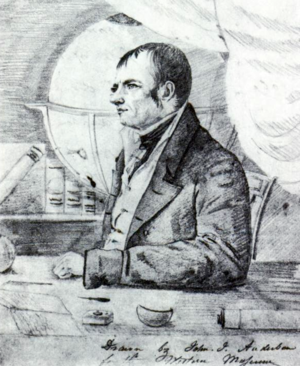John Cleves Symmes, Jr. (nonfiction): Difference between revisions
Jump to navigation
Jump to search
No edit summary |
No edit summary |
||
| Line 2: | Line 2: | ||
Symmes is best known for his 1818 variant of the (now-discredited) Hollow Earth Theory, which introduced the concept of openings to the inner world at the poles. | Symmes is best known for his 1818 variant of the (now-discredited) Hollow Earth Theory, which introduced the concept of openings to the inner world at the poles. | ||
Symmes' eldest son, Americus Symmes, was seventeen when his father died, leaving him as the sole support of the family, with an estate significantly in debt. | Symmes' eldest son, Americus Symmes, was seventeen when his father died, leaving him as the sole support of the family, with an estate significantly in debt. | ||
| Line 15: | Line 13: | ||
== Nonfiction cross-reference == | == Nonfiction cross-reference == | ||
External links: | |||
* [https://en.wikipedia.org/wiki/John_Cleves_Symmes,_Jr. John Cleves Symmes, Jr.] @ Wikipedia | * [https://en.wikipedia.org/wiki/John_Cleves_Symmes,_Jr. John Cleves Symmes, Jr.] @ Wikipedia | ||
Revision as of 19:00, 17 June 2016
John Cleves Symmes, Jr. (November 5, 1780 – May 28, 1829) was an American Army officer, trader, and lecturer.
Symmes is best known for his 1818 variant of the (now-discredited) Hollow Earth Theory, which introduced the concept of openings to the inner world at the poles.
Symmes' eldest son, Americus Symmes, was seventeen when his father died, leaving him as the sole support of the family, with an estate significantly in debt.
Americus provided for his mother and siblings and paid off his father's debts.
He also championed his father's legacy, erecting a memorial to him (a pylon topped with a globe carved in the shape of a hollow sphere) and publishing in 1878 an edited collection of his father's papers.
Fiction cross-reference
Nonfiction cross-reference
External links:
- John Cleves Symmes, Jr. @ Wikipedia
